10.24 Sport in Germany (2)
"König Fußball" (King Football)
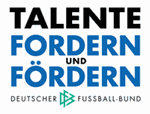 As in Britain, football is by far the most popular spectator sport in Germany. The football clubs of Borussia Dortmund and FC Schalke 04 both attract an average over 60,000 fans per home game in the German
Bundesliga, the top division in German football. In third place in terms of attendance is Germany's most successful club in terms of national and international titles - FC Bayern München. Bayern have won the German championship more than anyone else (17 times) and have also won the European Cup / Champions League four times, most recently in 2001. But there are also literally thousands of smaller football clubs throughout Germany. With more than 6.3 million members, the
Deutscher Fußball-Bund (DFB) (= German Football Federation) has the largest membership of any sports organisation in Germany. As in Britain, football is by far the most popular spectator sport in Germany. The football clubs of Borussia Dortmund and FC Schalke 04 both attract an average over 60,000 fans per home game in the German
Bundesliga, the top division in German football. In third place in terms of attendance is Germany's most successful club in terms of national and international titles - FC Bayern München. Bayern have won the German championship more than anyone else (17 times) and have also won the European Cup / Champions League four times, most recently in 2001. But there are also literally thousands of smaller football clubs throughout Germany. With more than 6.3 million members, the
Deutscher Fußball-Bund (DFB) (= German Football Federation) has the largest membership of any sports organisation in Germany.
 The success of the German national team has also contributed to the mass appeal of "König Fußball" (= King Football). Germany has won the World Cup three times (1954, 1974, 1990) and has been runners-up on a further four occasions (1966, 1982, 1986, 2002). And footballing heroes such as Uwe Seeler, Franz Beckenbauer, Lothar Matthäus and Jürgen Klinsmann have proved excellent sporting ambassadors for the nation abroad. The success of the German national team has also contributed to the mass appeal of "König Fußball" (= King Football). Germany has won the World Cup three times (1954, 1974, 1990) and has been runners-up on a further four occasions (1966, 1982, 1986, 2002). And footballing heroes such as Uwe Seeler, Franz Beckenbauer, Lothar Matthäus and Jürgen Klinsmann have proved excellent sporting ambassadors for the nation abroad.
German success at the 2002 World Cup
 Finishing runners-up at the 2002 World Cup in Japan and Korea was a sensational achievement for the team managed by popular ex-international Rudi Völler. For despite having won the European Championships in 1996, the German national squad had been widely perceived to be in decline. With not enough gifted players coming through the ranks, the Deutscher Fußball-Bund (DFB) launched programmes campaigns aimed at spotting and developing young German talent. Former international striker Jürgen Klinsmann urged German children to start playing street football again in their spare time as he had done as a boy. Finishing runners-up at the 2002 World Cup in Japan and Korea was a sensational achievement for the team managed by popular ex-international Rudi Völler. For despite having won the European Championships in 1996, the German national squad had been widely perceived to be in decline. With not enough gifted players coming through the ranks, the Deutscher Fußball-Bund (DFB) launched programmes campaigns aimed at spotting and developing young German talent. Former international striker Jürgen Klinsmann urged German children to start playing street football again in their spare time as he had done as a boy.
Expectations in Germany were thus quite low when the 2002 World Cup got started. Germany had required a playoff against Ukraine to qualify at all after an unconvincing qualifying campaign which had included
a 5-1 home defeat against England in the Olympic Stadium in Munich.
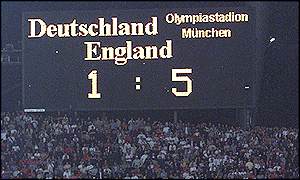 |
| Germany 1 England 5 |
|
Yet Germany grew in confidence as the tournament progressed.
An 8-0 victory over Saudi Arabia, in which Miroslav Klose scored a hat-trick, laid the foundation for Germany to top a tricky frist-round group which also included Cameroon and Ireland. It was then the turn of defenders such as
Sebastian Kehl to shine, as successive 1-0 victories over Paraguay, USA and hosts South Korea took the Nationalelf through to a clash in the finals with Brazil. Although an unfortunate error by goalkeeper Oliver Kahn ultimately handed Brazil a 2-0 victory, he was subsequently voted the player of the tournament by international journalists. And Kahn was cheered louder than anyone when the German team received a heroes welcome on their return to Frankfurt on July 1, 2002 (see pictures below).
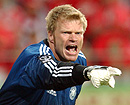 |
|
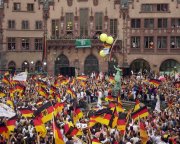 |
Golden years until 2006?
Uli Hoeness, the general manager of Bayern Munich, predicted after the tournament that German football would now experience "golden years". On one level this seems plausible, not least because Germany itself will be hosting the next World Cup finals in 2006. On another level however, domestic football is crying out for the kind of shot in the arm which the unexpected success in the Far East could provide. TV viewing figures for the Bundesliga have been dropping steadily for years. Whereas in the 1995/96 football season, an average of 6.83 million viewers watched "ran", the Saturday night Bundesliga highlights programme broadcast by Sat 1, the figure had dropped to a mere 4.33 million viewers by December 2001.
 And the pay TV channel Premiere, which has been showing all of the Bundesliga matches live for the last two seasons has only managed to attract 2.4 million paying customers. Most damagingly of all, the financial crisis affecting the
Kirch media group leaves German football in as uncertain a position as British football after the collapse of ITV Digital. Many big clubs such as Eintracht Frankfurt and 1.FC Kaiserslautern are already in extreme financial difficulties. And the pay TV channel Premiere, which has been showing all of the Bundesliga matches live for the last two seasons has only managed to attract 2.4 million paying customers. Most damagingly of all, the financial crisis affecting the
Kirch media group leaves German football in as uncertain a position as British football after the collapse of ITV Digital. Many big clubs such as Eintracht Frankfurt and 1.FC Kaiserslautern are already in extreme financial difficulties.
Other Sports
The German sporting landscape is quite different from that in Britain. Cricket and rugby have very little support in Germany, although rugby union is gradually establishing a presence in some towns and cities. Darts and snooker also enjoy a very limited media presence in Germany.
 Winter sports on the other hand enjoy a much greater popularity in the Federal Republic than in the UK. The opportunities for alpine and cross-country skiing, snowboarding and tobogganing make Germany's
mountainous regions a favourite destination for tourists. Both speed skating and in particular ice hockey are big spectator in Germany, with an average of 4,765 fans attending matches in the German ice-hockey league DEL. Germany in fact topped the medal table at the 2002 Winter Olympics in Salt Lake City, winning twelve gold, sixteen silver and seven bronze medals. The speed skaters Claudia Pechstein and Anni Friesinger were in record-breaking form. Switzerland finished tenth in the medals table, and Austria finished twelfth. Winter sports on the other hand enjoy a much greater popularity in the Federal Republic than in the UK. The opportunities for alpine and cross-country skiing, snowboarding and tobogganing make Germany's
mountainous regions a favourite destination for tourists. Both speed skating and in particular ice hockey are big spectator in Germany, with an average of 4,765 fans attending matches in the German ice-hockey league DEL. Germany in fact topped the medal table at the 2002 Winter Olympics in Salt Lake City, winning twelve gold, sixteen silver and seven bronze medals. The speed skaters Claudia Pechstein and Anni Friesinger were in record-breaking form. Switzerland finished tenth in the medals table, and Austria finished twelfth.
 Alongside basketball, volleyball and - increasingly - American football, handball is a good example of a sport that is much more popular in Germany than it is in Britain. More than five thousand handball clubs with 838,000 members belong to the German handball association Deutscher Handball-Bund (DHB). Alongside basketball, volleyball and - increasingly - American football, handball is a good example of a sport that is much more popular in Germany than it is in Britain. More than five thousand handball clubs with 838,000 members belong to the German handball association Deutscher Handball-Bund (DHB).
Germany's cycling boom has developed steadily throughout the 1990s, triggered by the reunification
of the country which brought the GDR's highly successful amateur cyclists into the professional fold.
Deutsche Telekom, Europe's largest telecommunications and internet service provider, sponsors a cycling team which won the Tour de France two years running, in the shape of the Dane Bjarne Riis in 1996 and then homegrown star Jan Ullrich in 1997, who has also finished runner-up in the race four times in the last six years. Another German cyclist, Erik Zabel, managed won the Tour de France points jersey for Team Telekom six years in a row (1996-2001). It is testimony to the popularity of cycling in Germany that both Ullrich and Zabel regularly triumph in annual national sporting polls.
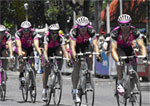 |
| Team Telekom |
|
Other German sports have similarly benefited from the success
of individual athletes. Single-minded Ferrari driver Michael Schumacher has won the Formula 1 championship four times, and is joined on the start grid by his brother Ralf as well as compatriots Heinz-Harald Frentzen and Nick Heidfeld. The tennis boom initiated by the Wimbledon victories of Boris Becker, Steffi Graf and Michael Stich lasted for much of the 1990s, although in recent times the pool of German tennis talent seems to have dried up somewhat.
 Bernhard Langer's victories in the US Masters in 1985 and 1993 can be seen to have triggered interest in golf - the number of golf clubs in the Federal Republic increased by 70% in the 1990s to its current figure of over 500. Yet these are primarily private clubs with high membership fees, targetted
at the business community, the well-off and overseas tourists. The absence of public municipal golf courses will possibly prove as detrimental to the sport's growth as the lack of public courts has to tennis. Bernhard Langer's victories in the US Masters in 1985 and 1993 can be seen to have triggered interest in golf - the number of golf clubs in the Federal Republic increased by 70% in the 1990s to its current figure of over 500. Yet these are primarily private clubs with high membership fees, targetted
at the business community, the well-off and overseas tourists. The absence of public municipal golf courses will possibly prove as detrimental to the sport's growth as the lack of public courts has to tennis.
 |
Web Links |
 |
| Web sites on sport in Germany |
 |
ran |
The football programme ran is broadcast by the private channel Sat 1 every Saturday and Sunday. On its webpage you can watch video highlights of each goal scored in the Bundesliga! |
 |
Bundesliga.de |
The homepage of the German Bundesliga allows you to listen to commentary of each first and second division match, as well as providing statistics and analysis. |
 |
kicker |
Visit the homepage of Germany's top football magazine, renowned for its reporting and statistical data. |
 |
11 Freunde |
The online edition of Germany's top football fanzine. In German only. |
 |
Indirekter Freistoß |
And this website based in Gießen analyses the World Cup from a German perspective. In German only. The title translates as "indirect free-kick". |
 |
World Cup 2002 |
The BBC's World Cup site allows you to track Germany's performance at the 2002 World Cup in Japan and South Korea. |
 |
World Cup 2006 |
The next World Cup will be held in Germany in 2006. This website shows how preparations are developing. In English and German. |
 |
max. Bundesliga |
The homepage of the Austrian Bundesliga with links, reports and articles. |
 |
Football.ch |
The homepage of the Swiss Football Association. |
 |
LFV |
The website of the Liechtenstein Football Association. |
 |
Deutscher Tennis Bund (DTB) |
Visit the homepage of the German Tennis Association. |
 |
Formel 1 |
Visit a German website devoted to Grand Prix racing. |
 |
Team Telekom |
Visit the homepage of the Telekom cycling team. |
 |
Golf Europe |
Plan a golfing holiday in Germany! |
 |
Sports Magazines |
Find a German-language magazine on your favourite sport with Exeter University's German Media Index. |
|
 Chapter 10.25: Vocabulary - Sport Chapter 10.25: Vocabulary - Sport
 Nach oben Nach oben
 Print This Page Print This Page
|